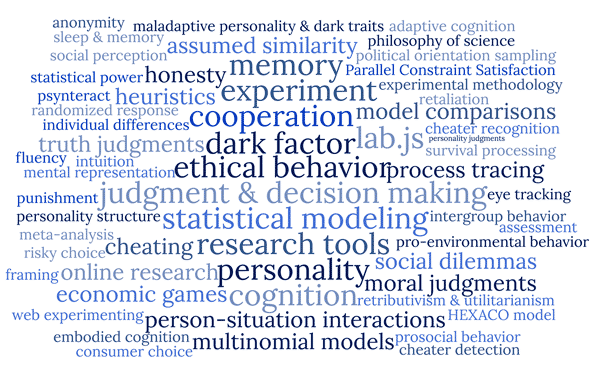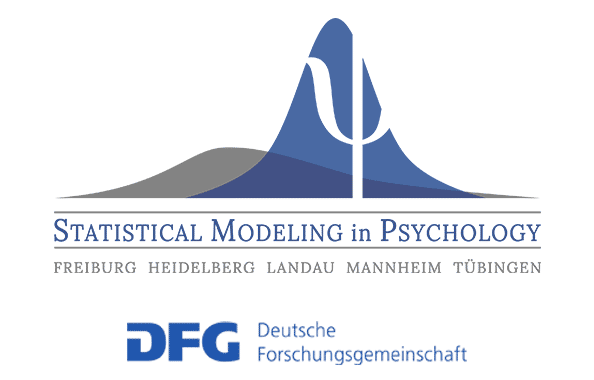
Overview of our research
 This page sketches the common framework of our research. For the specific research interests of our team members, please visit their individual homepages.
This page sketches the common framework of our research. For the specific research interests of our team members, please visit their individual homepages.
Most generally speaking, we share an interest human social/ethical behavior and (adaptive) cognition, studying the intra- and interpersonal processes that manifest themselves in social behavior (e.g. cooperation vs exploitation, prosociality, trust, punishment), ethical behavior (e.g., dishonesty, bribing, justifications), judgments (e.g. social judgments about strangers, moral judgments, judgments of truth), decisions (e.g., choice under risk and uncertainty, consumer choice, environmental behavior), and memory (recall, (source) recognition). Our research aims to explain and critically test (a) how humans behave and which determinants drive this behavior, (b) how humans search for, process, and store/retrieve information, (c) how individuals differ in their behavioral preferences, beliefs, and basic tendencies (personality dimensions) including "dark" traits (cf. darkfactor.org), (d) how situational factors shape or constrain cognition, behavior, and/or (the expression of) individual differences, and (e) how the methods of behavioral scientists to address these and other questions can be improved.
 On the methodological side, we mostly rely on behavioral/experimental methods and paradigms, complemented by an array of methods ranging from traditional questionnaires to interactive multi-person games (as developed in behavioral economics), process measures (e.g., eye- and mouse-tracking), and statistical/computational modeling; correspondingly, we are part of the Research Training Group Statistical Modeling in Psychology (SMiP), co-hosted by the Universities of Freiburg, Heidelberg, Landau, Mannheim, and Tübingen and funded by the German Research Foundation. The SMiP group aims to overcome a persistent and growing challenge in behavioral research, namely, the gap between substantive research in basic and applied fields of psychology and latest developments in statistical modeling and psychometrics.
On the methodological side, we mostly rely on behavioral/experimental methods and paradigms, complemented by an array of methods ranging from traditional questionnaires to interactive multi-person games (as developed in behavioral economics), process measures (e.g., eye- and mouse-tracking), and statistical/computational modeling; correspondingly, we are part of the Research Training Group Statistical Modeling in Psychology (SMiP), co-hosted by the Universities of Freiburg, Heidelberg, Landau, Mannheim, and Tübingen and funded by the German Research Foundation. The SMiP group aims to overcome a persistent and growing challenge in behavioral research, namely, the gap between substantive research in basic and applied fields of psychology and latest developments in statistical modeling and psychometrics.
Finally, we also develop tools for other researchers to use, most notably the lab.js Software for building web-based experiments. Indeed, we share the conviction that science is a highly collaborative effort and also embrace the principles of open, transparent, and reproducible research.